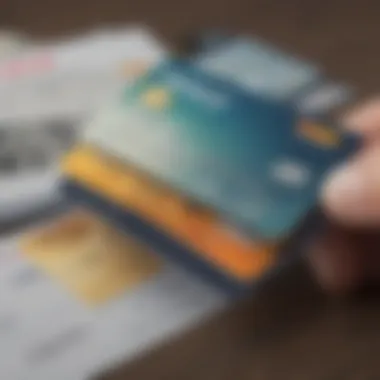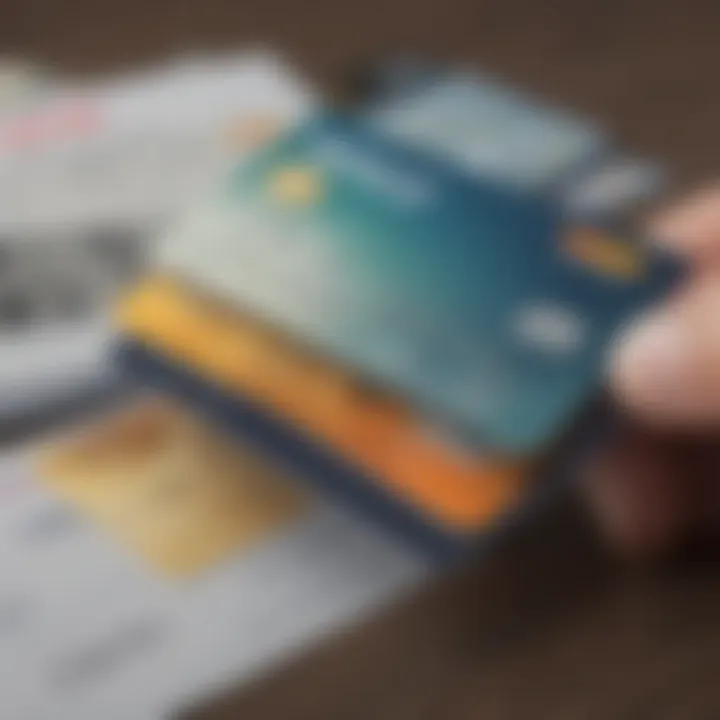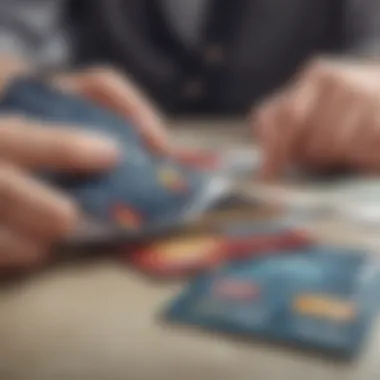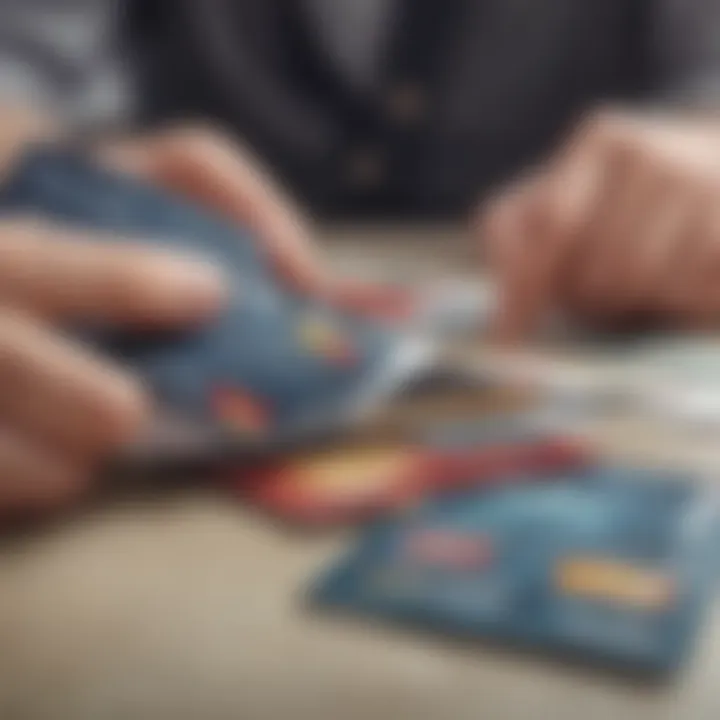Smart Strategies for Securing Credit Cards with Bad Credit


Intro
Navigating the world of credit cards can feel like walking through a minefield, especially for those with bad credit. The path is often fraught with uncertainty and frustration. Many people find themselves trapped in a cycle of denial; potential credit card offers may seem just out of reach, paving the way for missed opportunities and a stagnant financial life.
However, understanding what you’re dealing with can illuminate this dark winding path. Recognizing the underlying concepts and various alternatives is crucial to getting a handle on your financial future. This journey is not just about finding a credit card; it’s about understanding the broader landscape of credit products and regaining control over finances.
This article aims to dissect the various elements involved in securing a credit card under challenging circumstances. We’ll examine options available specifically for individuals with poor credit ratings, dive into essential terminology relevant to this journey, and unpack various products to help readers make informed decisions. The goal is not just clarity but also empowerment through knowledge.
Intro to Obtaining a Credit Card
In the vast world of personal finance, securing a credit card represents a pivotal step towards rebuilding one’s financial profile, especially for those grappling with bad credit. Understanding the nuances of credit cards can often make the difference between financial stability and ongoing struggle. This article seeks to provide clarity on the processes involved in obtaining a credit card for individuals with less than stellar credit histories, emphasizing the steps and considerations to be aware of.
Having a credit card is not just about purchasing power; it serves as a gateway to establishing and improving creditworthiness. The ability to make timely payments and manage credit responsibly can gradually rebuild what may feel like an insurmountable barrier. Beyond convenience, new credit avenues can inspire a sense of financial empowerment.
Understanding Credit Scores
At the core of the credit card acquisition process lies the credit score, a numeric representation of one’s creditworthiness. Creditors use this score to gauge the risk of lending money or extending credit. It's important to recognize that this score is influenced by various factors, including payment history, amounts owed, length of credit history, types of credit used, and new credit inquiries.
- Payment History (35%): Timely payments reflect your reliability as a borrower.
- Amounts Owed (30%): High balances relative to your credit limit can negatively impact your score.
- Length of Credit History (15%): Longer histories generally indicate experience with managing credit.
- Types of Credit (10%): A diverse mix can enhance your score.
- New Credit (10%): Too many inquiries in a short period can drop your score.
For someone with poor credit, understanding these elements provides an opportunity to address weaknesses. Simple actions, like making on-time payments and paying down existing debts, can lead to significant improvements.
The Importance of Credit History
Credit history is like a report card for how well one has handled financial obligations over time. It provides potential lenders with a comprehensive look at past behaviors, offering insight into what they can expect if they extend credit. A solid credit history doesn’t guarantee approval, but it certainly increases the chances.
An individual with a rocky financial past might still qualify for a credit card, albeit with higher interest rates or limited limits. Still, each successful management of credit can pave a path towards better opportunities. It’s crucial to build and maintain a positive credit history not only for card approvals but also for larger financial endeavors down the road, such as securing a mortgage or a car loan.
"Your credit history is your financial story—it’s captured in numbers, highlighting your journey with credit."
In summary, navigating the credit card landscape starts with a grasp of credit scores and history. By understanding their importance, individuals can better prepare for securing credit and taking control of their financial destinies.
Challenges Faced by Individuals with Bad Credit
Understanding the challenges faced by individuals with bad credit is pivotal. This segment delves into varied obstacles that create a cycle of financial insecurity. Those with tarnished credit histories often grapple with unique issues that can hinder their financial progress. Breaking down the challenges provides an essential foundation for exploring viable credit card options later in the article.
Effects of Late Payments
When someone falls behind on payments, the repercussions can be extensive. Late payments don't just attract a penalty; they can severely dent one’s credit score. Each occurrence of tardiness can linger on credit reports for up to seven years. Over time, repeated late payments pile pressure on an already weak credit score, making recovery seem more like a distant dream.
It's not just the score that suffers, also the individual feels trapped in a cycle. Fear of additional late fees compounds stress, creating a sense of helplessness. Financial relationships with creditors can sour, making it difficult to negotiate terms in the future. Timely payments are crucial not just for maintaining a positive credit score, but also for laying the foundation for future financial opportunities.
Higher Interest Rates
Individuals with poor credit usually face higher interest rates on any credit products they attempt to secure. This reality can often feel like a double-edged sword. Those requiring credit the most often find their options limited to terms that are not only unpalatable but can create further financial strain. The compounding effect of high interest can lead to paying far more than what was borrowed.
For instance, someone with a credit score of 580 might land a credit card charging 25% APR compared to someone with a score above 700 who might snag an offer closer to 15%. In simple terms, the higher the risk perceived by creditors, the higher the cost to the consumer. This could tempt individuals to take desperate measures, further complicating their financial affairs and driving them deeper into debt.
Rejection from Mainstream Providers
Another pressing challenge is the risk of rejection from mainstream credit card providers. Many lenders shy away from individuals with poor credit, opting to cater to those with more stable financial backgrounds. It can feel discouraging to repeatedly face rejections when trying to regain control over personal finances.
This exclusion doesn’t only limit access to traditional credit cards but also means missing out on building a positive credit history through responsible usage. Thus, rejection can fold back into the already tangled web of adverse credit, creating a vicious cycle of denial and desperation. When seeking credit, feeling alienated from mainstream financial institutions can lead many to subpar alternatives that typecast them even deeper into the realm of bad credit.


Identifying Credit Card Options for Bad Credit
When it comes to finding a credit card, the struggle can feel like an uphill battle, especially for those with bad credit. This section shines a light on the various options available, opening doors that can lead you toward better financial health. Identifying suitable credit card options is crucial because it helps individuals understand their alternatives, avoid predatory practices, and start on a path to rebuilding their credit. It’s a journey that requires knowledge and resilience but knowing where to start can change the game.
Secured Credit Cards
How They Work
Secured credit cards function on a pretty straightforward premise: you put down a cash deposit that acts as your credit limit. For instance, if you deposit $300, that’s the most you can spend on the card. This deposit provides a safety net for the lender, making it less risky to extend credit to someone with poor credit history. The key characteristic of secured cards is that they help rebuild credit when users make responsible payments. This structure makes secured cards a popular choice amongst individuals needing a fresh start. However, the need for an upfront deposit might deter some from pursuing this option.
Benefits of Secured Cards
One of the standout benefits of secured credit cards is the ability to rebuild your credit history efficiently. As you make timely payments, your credit score can gradually improve. Additionally, secured cards often report to all three major credit bureaus, which adds a layer of credibility to your efforts. Moreover, many secured cards offer incentives like cash back on purchases or rewards points, further enhancing their appeal. However, users must remain aware of the minimum deposit they need to make, as it can strain finances.
Potential Drawbacks
Despite their advantages, secured credit cards come with a few caveats. One potential drawback is the upfront deposit that ties up a chunk of your funds. You’re effectively using your own money as collateral, and for some, this might seem counterintuitive. Additionally, fees can vary significantly; some cards charge annual fees or maintenance costs, which can chip away at the benefits. Users must thoroughly review terms before jumping in to ensure they won’t be blindsided down the road.
Unsecured Credit Cards for Poor Credit
Typical Features
Unsecured credit cards are slightly different from secured ones and don’t require any deposit. These cards still cater to individuals with bad credit, albeit with higher risk and, often, higher fees. You’ll typically see features like low credit limits, monthly maintenance fees, and higher-than-average interest rates. However, the allure of having access to a line of credit without having to scramble for an upfront deposit can be quite enticing for those ready to take the plunge.
Eligibility Criteria
Eligibility for unsecured credit cards is generally less stringent than for prime credit cards, but that doesn’t mean qualifying is a cakewalk. Lenders will consider your credit score, income, and sometimes even your existing debts. It’s vital to read the fine print to grasp finer details regarding what’s required. It’s worth mentioning, however, that being offered a card doesn’t guarantee it comes without pitfalls, so knowing your limits and conditions is critical.
Risks Involved
Choosing an unsecured credit card when you have bad credit can involve certain risks. While it might feel liberating to avoid a deposit, the repercussions of mismanagement can be severe. Late payments could send your score plummeting even further. Plus, the high-interest rates mean that any outstanding balance will accrue quickly. Also, some cards may come with hidden fees that can outpace benefits, making them a costly option in the long run.
Store Credit Cards
Pros and Cons
Store credit cards are another option often overlooked. They typically provide attractive discounts or rewards for store purchases. However, they often come with limited usability—more suitable for frequent shoppers at specific retailers. A significant pro is that they might have an easier approval process; however, the cons include high-interest rates and the risk of overspending in a bid to unlock rewards. Balancing these aspects requires careful consideration before committing.
Usage Scenarios
When considering whether to apply for a store credit card, it helps to think of your shopping habits. If you frequently purchase from a specific store, the benefits, like earning rewards or exclusive discounts, can be quite advantageous. On the flip side, if you need a versatile card for broader spending, store cards might not serve you well. Understanding where you'll use the card can prevent buyer's remorse later.
Managing Store Cards
Managing a store credit card can be a balancing act. Keeping the credit utilization low is crucial for a healthy credit score. Paying bills on time also remains vital, as late payments may lead to high penalties and interest rates. Furthermore, some store cards have limited payment options, so it’s essential to plan accordingly to avoid any surprises. In brief, make the most of rewards, but tread carefully to prevent accruing unnecessary debt.
Each option for securing credit cards varies in different aspects, thus requiring individuals to weigh their choices carefully. Having knowledge about these options can empower individuals with bad credit to rebuild their financial profiles strategically.
Alternative Financial Solutions
When dealing with bad credit, traditional credit cards often feel like a closed door. Yet, alternative financial solutions can provide a practical lifeline. These options not only help rebuild credit but also fill in the gaps where standard cards might falter. The importance of exploring alternatives lies in their potential to reshape one’s financial journey.
- Prepaid Cards
These cards are not linked to a line of credit like traditional credit cards. Instead, users load money onto the card and spend within that limit, making them a solid choice for those aiming to control their spending habits.


Benefits and Limitations
One of the key characteristics of prepaid cards is their simplicity. Users can only spend what they load, helping to avoid debt. This setup allows individuals to manage their finances effectively if they stick to their budget. Prepaid cards are beneficial since they generally don’t require a credit check, making them accessible to those with poor credit.
However, one must consider the fees that can come with prepaid cards, such as loading fees or monthly maintenance charges. These costs, though manageable, can add up and deserve attention when making a decision.
Comparison to Credit Cards
Unlike credit cards, prepaid cards aren't a borrowing tool. This distinction is crucial since many individuals with bad credit might struggle with managing debt. Prepaid cards serve as a gateway to disciplined spending. They don’t affect your credit score since they don't report transactions to the credit bureaus directly. However, without a credit history being built, the customers don’t improve their credit standing. This limitation means that while prepaid cards can be an excellent tool for budgeting, they won’t assist any credit recovery efforts per se.
- Credit Builder Loans
These loans specifically aim to improve a borrower's credit history. They work by holding the borrowed funds in a bank account until the loan is fully paid off. Upon repayment, the lender reports the activity to credit bureaus.
Loan Mechanics
The mechanics behind these loans are straightforward. Usually, a small loan is taken out, and the borrower makes monthly payments. The amount repaid serves as a means to reflect good payment behavior. This format makes it a beneficial choice for those desperate for credit improvement. It’s essentially a way to practice responsible borrowing. A downside to consider is that not all lenders offer them, and those who do might charge high-interest rates. It’s essential to weigh the benefit of improving one’s credit against the costs involved.
Impact on Credit Score
Credit builder loans can greatly impact a person's credit score positively. After consistent payments, borrowers show they can handle credit responsibly, which essentially boosts their score. This characteristic makes these loans a strategic choice for rebuilding credit eligibility. However, on the flip side, if payments are missed, not only is the immediate impact damaging, but it also makes future access to credit harder. Therefore, it’s crucial to assess your financial situation and ensure that you can handle the loan repayments consistently.
In summary, exploring alternative financial solutions provides individuals with bad credit a pathway to regain control over their finances. Whether through the mindful spending of prepaid cards or the structured rebuilding tat can come from credit builder loans, these options contribute to a more stable financial future. Decisions made today can pivot one's credit future and put them back on a course towards financial health.
Strategies for Improving Credit Eligibility
Improving credit eligibility is not just a fading thought for a brighter financial future; it’s the beacon guiding individuals with bad credit towards healthier financial landscapes. This section digs deep into why this topic is paramount, showcasing methods that can help lift individuals from the murky waters of poor credit ratings. The benefits of elevating one’s credit standing are multifold, including access to better credit card options, lower interest rates, and an overall sense of financial confidence.
Paying Off Debts
When it comes to credit, debts have a nasty habit of piling up like dirty laundry. The first step to improving eligibility is tackling these outstanding debts. Paying off high-interest loans or credit card balances is essential as it not only reduces overall debt but also positively impacts the credit utilization ratio, a key factor that influences credit scores.
By focusing on debts with the highest interest rates first, often referred to as the snowball or avalanche method, individuals can strategically lower their financial burdens. Consider the following actionable steps:
- List all debts in order of principal balance or interest rates.
- Allocate any extra funds to the highest priority debts to maximize impact.
- Make consistent, minimum payments on all other debts to keep them in check.
While it may take time, each payment brings you closer to a higher credit score and better future options.
Correcting Errors in Credit Reports
Don’t just take your credit report at face value. It could be littered with mistakes that drag your score down like weight on a ship. It's essential to regularly check your credit reports for inaccuracies. These inaccuracies can stem from clerical errors, outdated information, or even identity theft. Finding an error on your report is like finding an unexpected treasure; it can mean a considerable improvement in your credit score if rectified. Here’s what to keep in mind:
- Obtain free copies of your credit report at AnnualCreditReport.com.
- Review each account thoroughly and highlight any discrepancies.
- File a dispute with the credit reporting agency if you spot inaccuracies. Be sure to include supporting documentation.
Promptly addressing these errors can clear the path for an improved credit score. Keeping a close eye on your report also shows lenders that you are proactive and diligent with your finances.
Establishing a Positive Payment History
The saying goes, "Good things come to those who wait," but in the world of credit—waiting can hurt. Establishing a positive payment history is crucial. This becomes your golden ticket to rebuilding credit. Each on-time payment acts as a building block, enhancing credibility with lenders over time. Here are some strategies to establish a solid payment history:
- Set up automatic payments wherever possible to never miss a due date.
- Use reminders, whether on your phone or calendar, to keep payment dates top of mind.
- Consider getting a credit card with automatic reporting to the credit bureaus to help build your reputation.
Over time, these efforts can dramatically bolster your credit score, paving the way for eligibility toward better financial products.
Establishing a positive payment history is not merely a strategy; it's an investment in your financial future.
In summary, tackling debts, correcting errors in credit reports, and establishing a positive payment history form the triad of strategies vital for improving credit eligibility. Engaging in these practices not only puts individuals on the path to financial recovery but also imbues them with the confidence to navigate the often intricate credit landscape.


Understanding Credit Card Terms and Conditions
Grasping the details of credit card terms and conditions is crucial, especially for individuals with bad credit. This knowledge plays a vital role in not just choosing a card but also navigating its use effectively. When you’re already on shaky ground with your credit, being informed can prevent further financial mishaps and help in regaining control over your finances.
APR and Other Fees
Annual Percentage Rate (APR) is a term that every potential credit card holder should understand. Simply put, it represents the yearly interest rate charged on borrowed money. For those with bad credit, the APR can be significantly higher, translating into greater costs over time.
When perusing different credit offerings, keep an eye out for the following types of fees associated with credit cards:
- Annual Fees: Some cards charge a set yearly fee for access to credit. This fee can often erode the benefits if not carefully checked against the card's offerings.
- Late Payment Fees: Missing a payment can lead to hefty penalties. For individuals already juggling poor credit, this can snowball into bigger issues.
- Cash Advance Fees: If you opt to withdraw cash using your card, be prepared for high fees and immediate interest accrual, often at a higher rate than normal purchases.
Many people overlook these fees, but they can stack up quickly, leaving you in a difficult spot. For instance, a credit card that seems appealing at first glance may become a financial burden once the annual fee, high APR, and various other charges come into play.
"Understanding the costs associated with credit products is key to avoiding financial traps that could worsen your situation."
Understanding Grace Periods
A grace period is a valuable feature that many credit cards offer. This time frame usually spans a few weeks after the statement closing date during which no interest is charged on new purchases if the entire balance is paid off by the due date. However, it’s crucial to note that grace periods only apply if you had a zero balance at the start of the billing cycle. If you carry a balance, interest will accrue immediately on new charges.
Knowing how a grace period works can provide you with flexibility in managing your finances:
- Avoiding Interest: By making timely payments and taking advantage of this period, you can save a significant amount on interest.
- Timing Purchases: If you know your due date, you can time your purchases better, reducing the effective interest you might otherwise incur.
- Credit Score Impact: Regular, timely payments can boost your credit score, making you eligible for more favorable credit terms in the future.
However, it's a fine line to walk. Missing the due date or carrying a balance can lead to lost grace periods and penalties, a particularly precarious situation for someone already on the bad credit spectrum. Therefore, familiarity with these terms allows for staying ahead of fees and pitfalls that are all too easy to fall into. In a landscape where credit options may feel limited, understanding the terms ensures that you're not just choosing a credit card but choosing wisely.
Making Informed Decisions
When it comes to handling personal finances, especially in the context of obtaining credit cards with bad credit, making informed decisions is of utmost significance. The financial landscape is increasingly complex, with myriad products and offers vying for attention. Those with poor credit might feel as though they are standing at a crossroads, uncertain of which path to take. Understanding how to navigate this murky terrain gives one a solid footing in the quest to regain financial stability.
Informed choices are intertwined with awareness of one’s own financial circumstances, the credit products available, and the potential consequences of these decisions. Benefits abound when one takes the time to evaluate their options carefully. For instance, rather than hastily jumping on the first credit card option that appears, thoughtful assessment can lead to better rates, lower fees, and far more favorable terms.
Making informed decisions can also serve to boost confidence in dealing with financial matters. After all, possessing knowledge allows one to engage with lenders on a more equal footing. This proactive approach fosters a level of empowerment, encouraging individuals to advocate for their own financial well-being. Furthermore, understanding credit concepts deeply can unveil the long-term implications of financial choices, such as how each payment contributes to credit history and overall financial health.
In this article, we will explore the nuances of assessing credit offers, as well as the pathways to seek financial counseling, which can further enrich one’s understanding.
Evaluating Credit Offers
When you’re faced with the challenge of selecting a credit card amid bad credit, evaluating credit offers is essential. It’s about deciphering the fine print rather than just skimming the surface. Look for key indicators such as Annual Percentage Rate (APR), fees, and terms of repayment. These factors can vary dramatically between products.
- Understanding Fees: Many credit cards come laden with various fees, including annual fees, late payment fees, and balance transfer fees, which can add up quickly. Knowing the total cost of ownership gives a clearer picture of what you might actually pay.
- Assessing APR: The APR essentially dictates how much interest will accumulate over time. A seemingly small difference in APR can translate into significant spending over the life of the card, especially if you carry a balance.
- Special Offers: Be cautious with promotional offers that sound too good to be true. They often come with strings attached. Whether it’s a temporary low APR or cash back incentives, one should always read the mechanics tied to such offers carefully.
Engaging in comprehensive evaluations can lead to finding a card that fits one’s unique financial situation rather than one that merely looks good on paper. Every individual has different needs, and hence what works for one might not suit another.
Seeking Financial Counseling
Seeking financial counseling is often regarded as a prudent step for anyone navigating the credit landscape, more so for individuals struggling with bad credit. Professional financial advisors can provide personalized guidance tailored to one’s specific financial condition, helping illuminate potential pitfalls and opportunities that may not be immediately evident.
- Understanding Financial Plans: Counselors can assist in creating solid financial plans that bolster credit scores and ensure healthy spending habits. They often utilize tools and strategies grounded in experience to help others succeed.
- Support through Emotional Strain: Finances can weigh heavily on one’s mind, leading to anxiety and frustration. Financial counseling addresses not just numbers but also emotional well-being, fostering a mindset for achieving sustainable financial habits.
- Accessing Community Resources: Many financial counseling services are connected to resources in the community, presenting options for individuals to explore that they might not have considered previously, such as local workshops or programs.
In closing, making informed decisions encompasses far more than merely choosing a credit card. It requires diligence, reflection, and proactive engagement with both one’s financial status and external resources. By evaluating credit offers thoroughly and considering financial counseling, individuals equip themselves with the tools needed for a more stable financial future.
Epilogue
Navigating the realm of credit cards is a daunting endeavor, especially when mired in the complications that arise from bad credit. It's essential to understand the content covered in this article, as it lays the groundwork for making informed financial decisions. Being stuck with a poor credit situation isn’t the end of the road; rather, it highlights the need for strategic planning and education around credit options.
The recap of key points we've discussed reinforces the fact that while challenges exist—such as high interest rates and limited card choices—numerous avenues are open to individuals wishing to rebuild their credit standing. Options like secured credit cards and credit builder loans provide practical solutions for those willing to invest time and effort into improving their financial situation.
Moreover, it is crucial to grasp the next steps for financial recovery. Focusing on payment history, correcting credit report errors, and seeking help from financial experts can significantly alter one's credit landscape. This process requires persistence and a willingness to learn about financial responsibilities.
In summary, understanding the ins and outs of credit card options leads to empowerment and serves as a catalyst for better financial health. It's akin to steering a ship through a storm—knowledge equips individuals with the tools to navigate these choppy waters safely and successfully.



